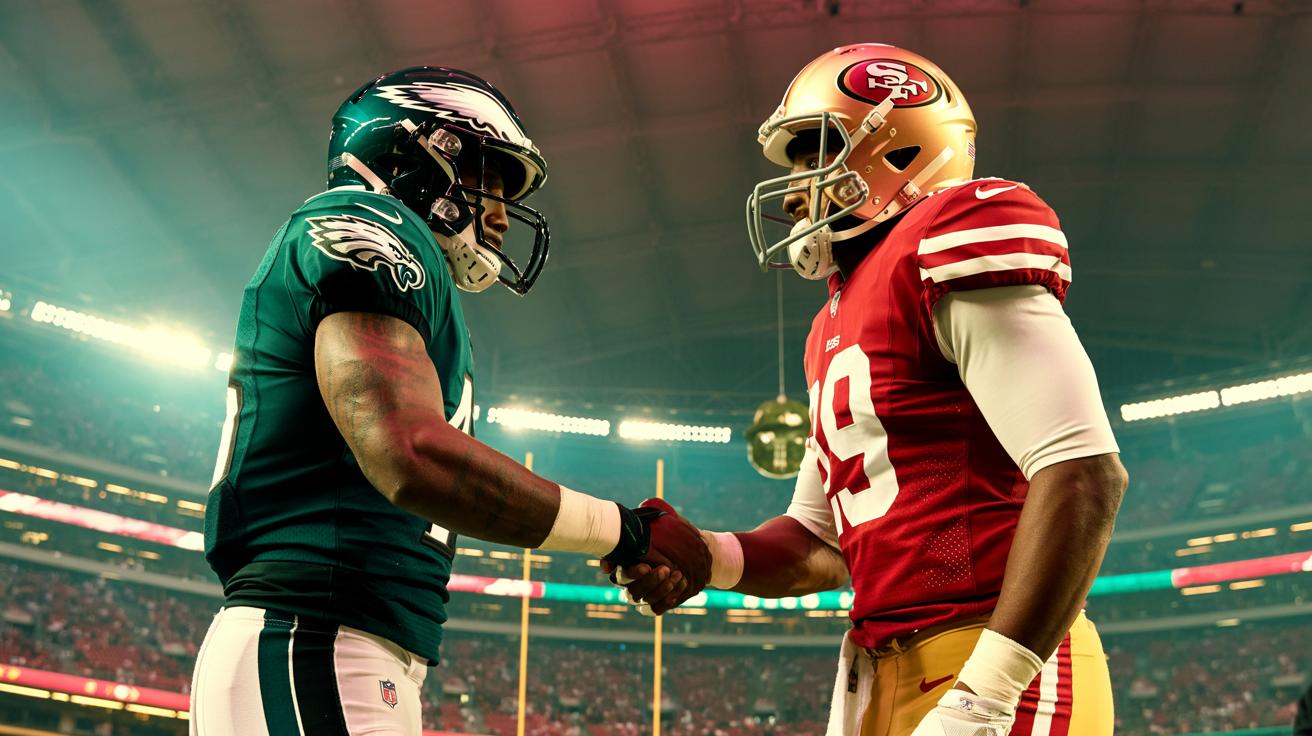What You Need to Know
- 🦅 Philadelphia Eagles and San Francisco 49ers finalize a significant trade involving veteran edge rusher Bryce Huff.
- 💰 The Eagles clear over $15 million in cap space, though practical savings amount to only $2.4 million.
- 🔄 Huff reunites with Robert Saleh in San Francisco, where he can focus on his pass-rushing strengths.
- 📈 The trade reflects the dynamic nature of NFL team management, highlighting strategic financial maneuvers and player alignment.
- 🛡️ The Eagles face a defensive reshuffle, with opportunities for players like Jalyx Hunt to step into more prominent roles.
The world of professional football is abuzz with the latest trade developments involving the Philadelphia Eagles and San Francisco 49ers. The spotlight is on the trade of veteran edge rusher Bryce Huff, a move that is creating ripples throughout the NFL. The trade, which involves a significant restructuring of Huff’s contract, is not only a strategic maneuver by both teams but also a testament to the dynamic nature of NFL trades. As Huff prepares to transition from the Eagles to the 49ers, this development underscores the intricate balance of team strategy, player performance, and financial implications in professional sports.
The Financial Impact of the Trade
The trade of Bryce Huff is more than just a player switch; it’s a financial recalibration for the Philadelphia Eagles. Initially, Huff’s contract was set to impact the Eagles’ 2025 salary cap by a substantial $7.4 million. However, with the restructuring, the Eagles will clear over $15 million, though in practical terms, they achieve just $2.4 million in savings. This is due to the complex nature of NFL contracts, where bonuses and prorated charges play a significant role. The Eagles, known for their adept salary cap management under General Manager Howie Roseman, have strategically maneuvered this trade to absorb a $4.94 million dead cap charge this year and a significant $16.6 million in dead money in 2026.
Such financial gymnastics are critical in maintaining a competitive team within the constraints of the NFL’s salary cap. By converting $9.05 million of Huff’s salary into a signing bonus, the Eagles have adeptly spread their financial obligations, allowing them to remain flexible in future roster decisions. This move exemplifies the complex interplay of financial strategy and player management, crucial for any team aiming to maintain its competitive edge.
Bryce Huff’s Journey to the 49ers
Bryce Huff’s journey from the Eagles to the 49ers marks a significant chapter in his professional career. Known for his prowess as an edge rusher, Huff made headlines with his impressive 2023 performance, which included 10 sacks and a league-high pressure rate. However, his adaptation to Vic Fangio‘s scheme in Philadelphia proved challenging, as it required versatility beyond his traditional role. This trade to the 49ers, facilitated by a restructured contract, reunites Huff with Robert Saleh, under whom Huff thrived during their time with the New York Jets.
In San Francisco, Huff is expected to return to his core strength—rushing the passer. This shift in focus is anticipated to bolster the 49ers’ defensive lineup, providing Huff with the opportunity to excel under a familiar system. Furthermore, this move allows the 49ers to strategically utilize their roster, freeing up the talented Mykel Williams for more dynamic roles on third downs. The trade underscores the importance of aligning player skills with team strategies, a key factor in achieving success in the NFL.
The Eagles’ Roster Adjustments
For the Philadelphia Eagles, the trade of Bryce Huff necessitates a reevaluation of their defensive roster. With Huff’s departure, the team faces the challenge of filling the void left by his absence. The Eagles have several options at their disposal, having recently re-signed Patrick Johnson and acquired Azeez Ojulari and Josh Uche. Additionally, 2024 third-round pick Jalyx Hunt has shown potential during the team’s playoff run, making him a strong contender for a starting position.
This period of transition is also an opportunity for the Eagles to capitalize on the flexibility afforded by their strategic financial planning. General Manager Howie Roseman’s decision to restructure Huff’s contract before the trade is a testament to his ability to make difficult decisions for the long-term benefit of the team. The Eagles’ proactive approach in managing their roster and salary cap is essential for maintaining their competitive standing in the league.
What This Means for the NFL Landscape
The trade between the Eagles and 49ers is more than a simple player exchange; it reflects broader trends in the NFL regarding contract management and team strategy. As teams navigate the complexities of the salary cap, trades like these become vital tools for achieving a balance between financial obligations and on-field performance. The ability to restructure contracts, absorb dead money, and make strategic player swaps is essential for teams aiming to build a sustainable competitive edge.
Moreover, trades that involve significant financial maneuvering, like the Huff deal, highlight the evolving nature of NFL team management. These moves underscore the importance of having a clear vision and the flexibility to adapt to changing circumstances. As fans and analysts alike watch the impact of this trade unfold, it raises a compelling question: How will other teams adapt their strategies in response to such complex and strategic maneuvers in the future?
Did you like it?4.7/5 (22)






